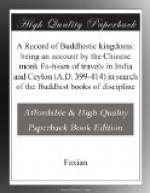(8) See the preparation of such a deed of grant in a special case, as related in chapter xxxix. No doubt in Fa-hien’s time, and long before and after it, it was the custom to engrave such deeds on plates of metal.
(9) “No monk can eat solid food except between sunrise and noon,” and total abstinence from intoxicating drinks is obligatory (Davids’ Manual, p. 163). Food eaten at any other part of the day is called vikala, and forbidden; but a weary traveller might receive unseasonable refreshment, consisting, as Watters has shown (Ch. Rev. viii. 282), of honey, butter, treacle, and sesamum oil.
(10) The expression here is somewhat perplexing; but it occurs again in chapter xxxviii; and the meaning is clear. See Watters, Ch. Rev. viii. 282, 3. The rules are given at length in the Sacred Books of the East, vol. xx, p. 272 and foll., and p. 279 and foll.
(11) Sariputtra (Singh. Seriyut) was one of the principal disciples of Buddha, and indeed the most learned and ingenious of them all, so that he obtained the title of {.} {.}, “knowledge and wisdom.” He is also called Buddha’s “right-hand attendant.” His name is derived from that of his mother Sarika, the wife of Tishya, a native of Nalanda. In Spence Hardy, he often appears under the name of Upatissa (Upa-tishya), derived from his father. Several Sastras are ascribed to him, and indeed the followers of the Abhidharma look on him as their founder. He died before Sakyamuni; but is to reappear as a future Buddha. Eitel, pp. 123, 124.
(12) Mugalan, the Singhalese name of this disciple, is more pronounceable. He also was one of the principal disciples, called Buddha’s “left-hand attendant.” He was distinguished for his power of vision, and his magical powers. The name in the text is derived from the former attribute, and it was by the latter that he took up an artist to Tushita to get a view of Sakyamuni, and so make a statue of him. (Compare the similar story in chap. vi.) He went to hell, and released his mother. He also died before Sakyamuni, and is to reappear as Buddha. Eitel, p. 65.
(13) See chapter xii, note 2.
(14) A passage rather difficult
to construe. The “families” would
be
those more devout than their neighbours.
(15) One rarely hears this preaching in China. It struck me most as I once heard it at Osaka in Japan. There was a pulpit in a large hall of the temple, and the audience sat around on the matted floor. One priest took the pulpit after another; and the hearers nodded their heads occasionally, and indicated their sympathy now and then by an audible “h’m,” which reminded me of Carlyle’s description of meetings of “The Ironsides” of Cromwell.
(16) This last statement is wanting in the Chinese editions.




